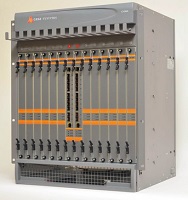Casa Systems Guns For DOCSIS 3.1
The smarter way to stay on top of the multichannel video marketplace. Sign up below.
You are now subscribed
Your newsletter sign-up was successful

Casa Systems has introduced a high-density DOCSIS 3.1-pointing upstream module as it prepares to support a new CableLabs spec that will play a role in the industry’s all-IP transition and target capacities of up to 10 Gbps downstream and 1 Gbps upstream.
Casa said the 3.1 upstream module will snap into its C100G (pictured above) and C10G integrated Converged Cable Access Platform products, which tie together the functions of the cable modem termination system (CMTS) and the edge QAM.
According to the vendor, the new US16x8 module (16 ports and 8 channels per port) -- and the heir apparent to its US16x4 module -- will support an upstream spectrum block in the range of 5 MHz to 100 MHz, and houses four times the processing power of its predecessor.
By delivering 8 channel per port, Casa claims it can support a total of 128 channels per module. With the ability to pack 10 16x8 modules and one “protection module” in one of its integrated CCAPs, the platform can support up to 1,280 channels in the upstream direction, the company claimed.
In a software-defined architecture and model that is gaining steam among other CMTS and CCAP vendors, Casa noted that it is using Network Processor Units and Flexible Program Gate Arrays (FPGAs) that allow the card to be software upgraded to support DOCSIS 3.1.
CableLabs released the original DOCSIS 3.1 product specs last fall (new versions of those specs were published on March 20, 2014), and has previously stated that it will be up to CMTS and modem vendors to state when they will be ready for official 3.1 qualification testing.
Although Casa is the relative newcomer, it has been gaining ground on incumbent suppliers such as Arris and Cisco Systems as CCAP deployments heat up.
The smarter way to stay on top of the multichannel video marketplace. Sign up below.
According to Infonetics Research, Casa’s share of the CMTS/CCAP revenue in the fourth quarter of 2013 hit 23%, up from just 4% in the previous quarter. Cisco, meanwhile, topped the market with 44%, followed by Arris’s 33%.
